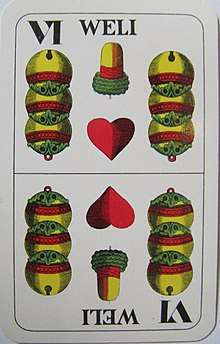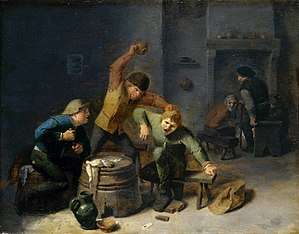Mauscheln
Mauscheln, also Maus or Vierblatt,[1] is a gambling card game that resembles Tippen, which is commonly played in Germany and the countries of the old Austro-Hungarian Empire.
 The Weli may be used as the 2nd highest trump | |
| Origin | Austria, Germany |
|---|---|
| Type | Plain-trick game |
| Family | Rams group |
| Players | 3 - 5 |
| Age range | 16+ |
| Cards | 32 |
| Deck | William Tell or German-suited pack |
| Play | Clockwise |
| Card rank (highest first) | A K O U 10 9 8 7 or A K Q J 10 9 8 7 |
| Related games | |
| Contra, Kratzen, Lupfen, Mistigri, Tippen, Zwicken | |
| Features: pot, 4 cards, optional special trumps | |

Background
Origin of the name
The name Mauscheln means something like "(secretive) talk". According to Meyers Konversationslexikon of 1885 to 1892 the word Mauschel is derived from the Hebrew word moscheh "Moses", in Ashkenazi Herbrew Mausche, Mousche, and was a nickname for Jews; in Old German mauscheln means something like "speak with a Jewish accent" or haggle". Today mauscheln is a synonym for "scheme", "wheel and deal", "wangle" or "diddle".[2]
Other names for the game include Anschlagen (in Tyrol and Lower Austria[3]), Polish Bank (Polnische Bank, not to be confused with another game of this name) or Panczok, also Kratzen,[4] or Frische Vier (in Lower Austria, Styria and Burgenland[3]). It also used to be known as Angehen.[5]
The 3-card game, Dreiblatt or Tippen, is very similar to Mauscheln.
History
Mauscheln first appeared towards the end of the 19th century and was initially very popular in Jewish trading circles. In 1890, Ulmann described Angehen as "very popular in ladies' circles", noting that it was called Mauscheln in south Germany.[6] During the First World War it flourished among the German soldiers and has since become widespread in the German-speaking world.[7]
Mauscheln is one of the most popular games in Austria and is commonly played everywhere except in the states of Vorarlberg in the west and Burgenland in the east.[8] One modern source describes it as little more than an excerpt of Ombre and Boston and "so simple and mindless that anyone can learn it in five minutes." The game clearly revolves around money, resulting in attempts to classify and ban it as a game of chance. However, it is not a gambling game in the legal sense.[7]
Basic rules
Players and cards
Like Tippen, Mauscheln may be played by 3 to 5 players with a 32-card, usually German-suited, pack. If more players participate a 52-card French pack may be used.[1][9]
Dealing
The dealer places a stake of four chips or coins (e.g. 40¢; it must be divisible by four) as the Pinke or Stamm in the pot and deals two cards to each player. The next one is turned as trumps and then another 2 cards are dealt. The remaining cards are placed face down on the table.[1]
Bidding
Forehand, left of the dealer, leads the bidding by announcing whether to "pass" (i.e. drop out of the current deal) or "diddle" (ich mauschele i.e. "I'll play"). In doing so, he undertakes to win at least two tricks. If he drops out, the other players in turn may opt to diddle. If no-one diddles, the cards are thrown in, the next player pays 4 chips to the pot and deals for the next game. Once a player has declared "diddle", the others may either "pass" (ich passe) or "play" (ich gehe mit i.e. "I'll join you").[1][9]
If all the others pass, the diddler (Mauschler) claims the pot without playing a game. If at least one other player joins in, all active players, in order, may exchange up to 4 hand cards with the talon, throwing their discards face down onto a 'bonfire' (Scheiterhaufen).[10][9]
Playing
The diddler leads to the first trick. Thereafter the winner of a trick leads to the next. Players must follow suit if possible (Farbzwang) or trump if unable (Trumpfzwang); in any case they must head the trick if they can (Stechzwang).[10][9]
Scoring
Scoring is as follows: [10][9]
- For every trick taken a player wins 1/4 of the Pinke
- If a player 'joins in' but fails to take a trick they pay a bête into the pot i.e. an amount equivalent to that in the pot; as does the diddler if he only succeeds in taking one trick.
- If the diddler remains trickless, he is a Mauschelbete ("diddler beast") and pays a double bête into the pot.
Variations
In addition to variations in cutting and dealing, the following other variations are recorded:[10]
Knocking
If the dealer turns up a high trump such as the Sow (= Ace/Deuce), and before looking at his cards, he may 'knock' (klopfen) which in effect means he will diddle. He takes over the game and has to take at least 2 tricks. If one or more of the others choose to play, the dealer looks at his cards, discards any he deems unfavourable and exchanges them with the trump turnup and fresh cards from the talon, without viewing them. Once the other active player(s) have exchanged, the dealer may pick up his new cards together with the 'knocked' trump.
Quartets
If anyone is dealt a quartet, they must discard them onto the bonfire, pay the Pinke and are then dealt another hand which they may exchange.
Belli
The ♦7 or ![]()
Weli
The Weli (![]()
See also
References
- Grupp & 1975/79, p. 20.
- "Wortschatz Uni Leipzig". Archived from the original on 2013-12-03. Retrieved 2018-10-22.
- Geiser 2004, pp. 58-61.
- Although Kratzen is usually played with 'hop and jump' and the Weli, unlike Mauscheln.
- Kastner & Folkvord 2005, p. 63.
- Ulmann 1890, p. 260/261.
- Mauscheln at www.casinospiegel.net. Retrieved 24 Oct 2018
- Geiser 2004, p. 40.
- Parlett 2008, p. 119.
- Grupp & 1975/79, p. 21.
Literature
- Geiser, Remigius (2004). "100 Kartenspiele des Landes Salzburg", in Talon, Issue 13.
- Grupp, Claus D (1975/1979). Karten-spiele, Falken, Niederhausen. ISBN 3-8068-2001-5
- Grupp, Claus D. (1976). Glücksspiele mit Kugel, Würfel und Karten, Falken Verlag, Wiesbaden.
- Grupp, Claus D. (1996/97). Kartenspiele im Familien und Freundeskreis. Revised and redesigned edition. Original edition. Falken, Niedernhausen/Ts. ISBN 3-635-60061-X
- Kastner, Hugo and Gerald Kador Folkvord (2005). Die große Humboldt-Enzyklopädie der Kartenspiele, Humboldt, Baden-Baden. ISBN 978-3-89994-058-9
- Parlett, David (1992). The Oxford Dictionary of Card Games, Oxford University Press, Oxford.
- Parlett, David (2008). The Penguin Book of Card Games, Penguin, London. ISBN 978-0-141-03787-5
- Ulmann, S. (1890). Das Buch der Familienspiele. A. Hartleben, Vienna, Munich and Pest.
External links
| Look up de:Mauscheln in Wiktionary, the free dictionary. |